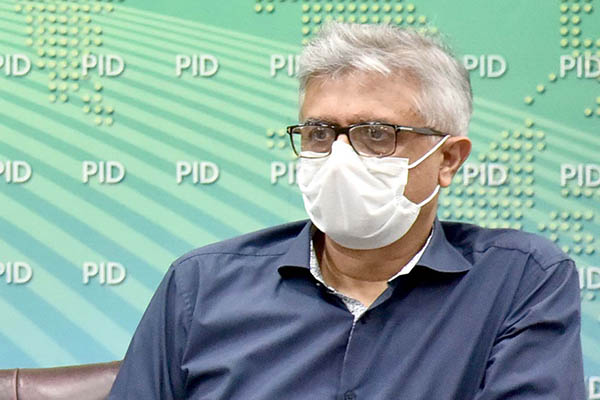
File photo. Courtesy PID
SAPM on Health claims government has signed deals of around 30 million doses of vaccines already, stressing this is despite global shortage
Special Assistant to the P.M. on Health Dr. Faisal Sultan on Monday said it was “unfair” of critics to compare Pakistan’s vaccination program with that of countries with self-sufficiency in producing their own vaccines.
Updating media on the national vaccination drive against coronavirus, he said that some members of the media and the general public had compared Pakistan’s response to that of Bhutan—a country with less than 1 million people. “We need to examine the context,” he said, noting that vaccinating 60 percent of their population was a very different prospect from accomplishing the same for Pakistan.
He then compared Pakistan’s vaccination drive to that of India—a self-sufficient vaccine producer—claiming the first dose was administered in Pakistan on Jan. 2, while India’s drive didn’t start until Jan. 16. India has thus far fully vaccinated just shy of 10 percent of its population; Pakistan currently stands at around 1 percent.
The SAPM said the government expected to receive 19 million doses of various vaccines by the end of June, stressing that around 90 percent of these were procured by the government. “This is to clarify that we are not relying solely on donations and charity,” he said.
Additionally, said Sultan, the government had inked deals worth 30 million doses of various vaccines already. “CanSino—the single dose vaccine [that had clinical trials in Pakistan]—will start to be packaged locally shortly,” he said, adding that it would allow Pakistan to prepare 3 million doses per month. “We are very thankful to China for this transfer of technology,” he added.
The special assistant said 100 million Pakistanis were eligible for the vaccines, as the rest of the population was aged under-18. “If the scientific evidence on this changes—and people under 18 can also be vaccinated—we can expand the eligible age groups,” he said, adding that of this 100 million, the government hoped to vaccinate 70 million by the end of the year.
Sultan stressed that Pakistan was striving its hardest to procure vaccines despite a global shortage. “We are succeeding in procuring and vaccinating our population,” he said, noting that even developed countries like Australia and Canada were facing issues with their vaccine programs. “They had to slow down their drives,” he said, adding even major producers like Astra-Zeneca are experiencing difficulties in manufacturing the required quantities. “The amount of money [being spent or allocated] is not that important right now, as you can’t secure supplies if none are available,” he added.
Pakistan on Monday expanded its vaccination drive to citizens aged 40-49, a few days after allowing walk-ins for residents aged 50 and older. Thus far, a little over 2 million doses have been administered, though it is unclear how many of these were single-dose and how many two-shot vaccines.
